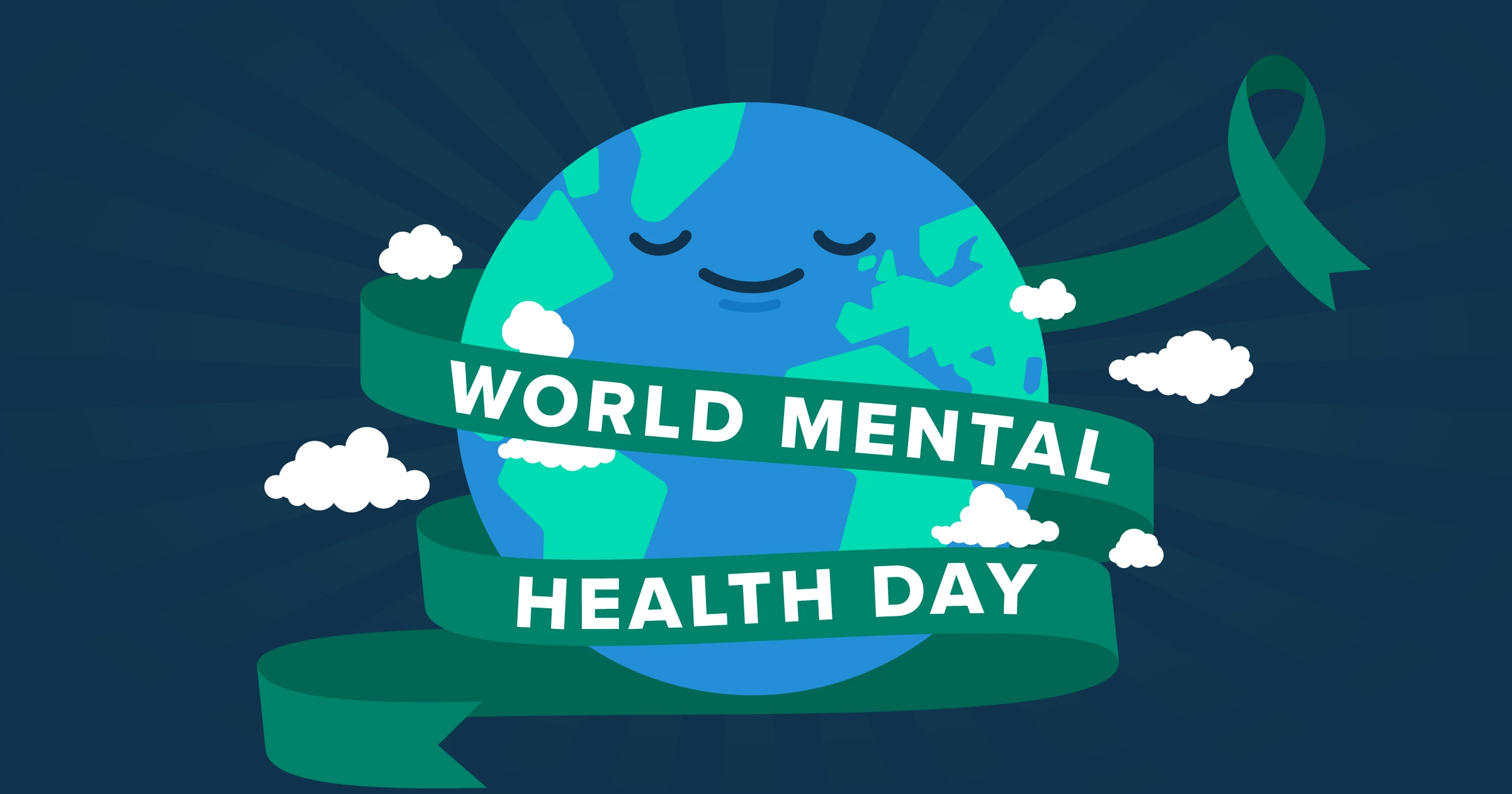World mental health day 2023
Mental health is a universal human right.
Mental health is a universal human right. This means that everyone, regardless of their race, gender, age, or socioeconomic status, is entitled to mental health services and support. In fact, the right to mental health is enshrined in the Universal Declaration of Human Rights, as well as the International Covenant on Economic, Social and Cultural Rights.
While mental health is a universal human right, it is not yet a reality for everyone. There are many barriers that prevent people from accessing mental health services, including stigma and discrimination, lack of resources, and a lack of understanding of mental health. These barriers are particularly acute for people in marginalized groups, such as people with disabilities, racial and ethnic minorities, and low-income individuals.
There are many reasons why it is important to ensure that everyone has access to mental health services. Mental health is essential to overall health and well-being, and mental health disorders can have a significant impact on a person's ability to function in daily life. Mental health is also strongly linked to physical health, and untreated mental health disorders can lead to higher rates of chronic disease and shorter life expectancy.
There are a number of ways to improve access to mental health services and support, including increasing funding for mental health services, increasing awareness of mental health issues, reducing stigma, and ensuring that mental health services are culturally appropriate. It is also important to invest in prevention and early intervention strategies, such as promoting positive mental health in schools and workplaces.
In addition to increasing access to mental health services, it is also important to promote positive mental health through policies and programs that foster resilience, improve coping skills, and build social support. This can be done at the individual, community, and societal levels. Some examples include stress management programs, social support groups, and mental health literacy education.
In order to effectively promote mental health, it is important to have accurate and up-to-date data on the prevalence and impact of mental health disorders. This data can be used to inform policy decisions, allocate resources, and develop interventions. Without data, it is difficult to assess the effectiveness of mental health programs and services. Mycarebuddy offers wellness products for all and also mental health services that fits different classes of people whether employees, kids, teens, couples or families. Check our catalog for whichever package suits you and your loved ones best. We care for you.
Understanding Your Kids and Teens' Mental Health
The mental health and well-being of our children and teenagers are of paramount importance. As parents, guardians, or caregivers, it is our responsibility to create a supportive environment where young minds can flourish emotionally and mentally. To achieve this, it's essential to understand the complexities of kids and teens' mental health. Below, are practical steps to guide you in understanding the mental health of your ward.
Recognize the Unique Challenges They Face
For starters, kids and teens face distinct challenges in today's rapidly changing world. These challenges include academic pressures, social dynamics, peer pressure, and the influence of technology and social media. Acknowledging these challenges is the first step in understanding their mental health. Each child is unique, and their experiences may vary, so it's crucial to listen and empathize with their specific concerns.
Open Communication
Effective communication is at the heart of understanding your child's mental health. Encourage open and honest dialogue, where they feel safe discussing their thoughts and feelings without fear of judgment. Active listening is key; give them your full attention and validate their emotions. Let them feel safe when talking with you.
Be Attuned to Signs of Distress
Kids and teens may not always express their emotions verbally. Look for behavioural and physical signs of distress, such as changes in sleep patterns, appetite, or academic performance. Increased irritability, withdrawal from social activities, or expressions of hopelessness can also be indicators of underlying mental health issues. Being attentive and observant is key, they may not always speak out but your ability to notice those signs and take action will go a long way.
Promote Emotional Literacy
Teaching kids and teens about emotions and how to manage them is crucial. Help them identify and label their feelings, and encourage healthy ways to cope with stress or sadness. This can include activities like journaling, art, or sports. It is important that kids are not only emotionally aware, but know that their feelings matter.
Destigmatize Mental Health
Normalize discussions about mental health within your family. Emphasize that seeking help when needed is a sign of strength, not weakness. Share stories of well-known figures who have openly discussed their mental health struggles to reduce stigma and show that they are not alone.
Seek Professional Help When Necessary
While it's essential to provide emotional support, some mental health issues may require professional intervention. If you notice persistent signs of distress or behavioural changes, consider consulting a mental health professional who specializes in child and adolescent psychology.
Create a Supportive Environment
Foster a nurturing and supportive home environment where your child feels safe and loved. Encourage healthy routines, including regular physical activity, a balanced diet, and sufficient sleep, as these play a significant role in mental well-being.
Lead by Example
Children often learn by observing their parents or caregivers. Model healthy coping mechanisms and self-care practices, demonstrating how to manage stress and prioritize mental health.
Respect Their Independence
As kids and teens grow, they seek more independence. While it's important to monitor their well-being, respecting their boundaries and giving them room to make age-appropriate decisions can promote their self-esteem and mental health.
Understanding your kids and teens' mental health is an ongoing process that requires patience, empathy, and active involvement. By creating a safe and open space for communication, being attuned to their needs, and offering guidance when necessary, you can help support their mental well-being and set them on a path to a healthier, happier future. Remember that every child is unique, and your efforts to understand and support them will make a significant difference in their lives. This also helps to bridge the gap between your children and you and enhance strong relationships. We have options that specially cater to the mental care needs of kids, teens and families as a whole at Mycarebuddy. Check our services to see whichever one suits you and your kids. Begin the journey to mental wellness for your kids and teens.
Why you need Therapy When Dealing with Depression
Depression, often described as a silent and invisible battle, is a mental health condition that affects millions of people worldwide. While its effects can be debilitating, the good news is that there are effective treatments available, and therapy is a cornerstone of managing and overcoming depression. The journey to recovery often starts with identifying the problem, having the wrong attitude to therapy does not help with that.
One of the primary reasons why therapy is crucial for individuals with depression is the professional guidance it offers. Licensed therapists are trained to understand the complexities of depression, its causes, and its various manifestations. They can provide you with a safe, non-judgmental space to express your thoughts and emotions, helping you gain insights into your condition. Talking and listening to the wrong persons when battling depression can lead to more complications mental health wise.
Depression often comes with a myriad of symptoms, including overwhelming sadness, hopelessness, and anxiety. Therapy equips you with valuable coping strategies tailored to your unique needs. Therapists can teach you practical skills to manage negative thought patterns, regulate your emotions, and navigate the challenges that depression brings. Imagine having intense mood swings or waves of sadness with no idea whatsoever how to salvage the situation, it could lead to harmful thoughts.
Depression is not just a standalone condition; it can be linked to underlying issues such as trauma, unresolved grief, or chronic stress. Therapy allows you to explore these root causes, giving you a better understanding of why you may be experiencing depression. Addressing these underlying issues is crucial for effective long-term treatment. Again, the journey to recovery begins with identifying the problem, knowing the root cause of depression will slowly lead to healing.
In many cases, therapy is combined with medication to treat depression. Therapists can work closely with psychiatrists to monitor your progress and help you manage any side effects or concerns related to medication. This collaborative approach ensures a holistic and tailored treatment plan.
Depression often leaves individuals feeling isolated and misunderstood. Therapy provides a space where you can openly discuss your feelings without fear of judgment. Therapists offer validation and support, reminding you that your experiences are real and deserving of attention. No one will understand you better than a therapist, especially in a part of the world that mental health is not a priority. Therapy creates a safe space where your issues will be addressed adequately.
Living with depression can make it challenging to set and achieve goals, whether they are related to work, relationships, or personal growth. Therapists can assist you in setting realistic and achievable goals, breaking them down into manageable steps. This process can help rebuild your self-esteem and sense of accomplishment. Therapy gets you back on your feet to do the things you do not normally do.
Depression has a tendency to recur, and therapy plays a crucial role in preventing relapse. By acquiring the skills and strategies learned in therapy, you can better recognize early signs of depression and take proactive steps to manage it before it worsens. When depression is not treated right it will keep coming and resurfacing.
Ultimately, therapy's goal when dealing with depression is to enhance your overall quality of life. With the right therapeutic approach, you can experience an improvement in your mood, relationships, and daily functioning. Therapy empowers you to regain control over your life and rediscover joy.
In the battle against depression, therapy stands as a beacon of hope and healing. It offers professional guidance, coping strategies, and a supportive environment for individuals struggling with this challenging condition. Remember, seeking therapy is not a sign of weakness but a courageous step toward a brighter, healthier future. If you or someone you know is dealing with depression, don't hesitate to reach out to us at Mycarebuddy, we have qualified therapists who can provide the necessary support and guidance on the path to recovery. Begin your journey to wellness today, get care.
Recognizing the Signs of Depression
Depression is a common but serious mental health condition that affects millions of people worldwide. One of the challenges of dealing with depression is that it often goes unnoticed or undiagnosed. It is also important to know these symptoms so as to be able to distinguish depression from other mental health-related challenges. Recognizing the signs of depression is essential for early intervention and support. We will be exploring those signs with you below:
Persistent Sadness and Hopelessness
One of the most prominent signs of depression is a deep and persistent feeling of sadness or hopelessness that lasts for weeks or even months. This emotional pain may not have an obvious cause and can significantly impact a person's daily life. This feeling makes whoever is involved not have the drive to embark on any major life-changing journeys because to them they are certain they will fail. Past failures contribute to this feeling of sadness and it keeps them from having any positive outlook on life.
Loss of Interest or Pleasure
Depression often leads to a loss of interest in activities that were once enjoyable. This includes hobbies, social gatherings, and even personal relationships. People with depression may feel a pervasive sense of apathy and disinterest in life. They become their favourite company because they feel that no one really wants them around, therefore they will rather be left by themselves.
Changes in Sleep Patterns
Depression can affect sleep in different ways. Some individuals may experience insomnia, struggling to fall asleep or stay asleep. Others may oversleep and find it difficult to get out of bed in the morning. Disrupted sleep patterns are a common symptom of depression. Either overthinking keeps them awake, or the fear to face the harshness of trying to fit in keeps them asleep.
Fatigue and Lack of Energy
Feeling constantly tired and lacking energy is a common physical symptom of depression. Even small tasks may feel overwhelming, and everyday activities may become a significant effort. They are always tired, they are always sleepy, and the energy to carry out task is a struggle to have. This in turn impedes productivity.
Changes in Appetite and Weight
Depression can lead to changes in appetite, resulting in either overeating or loss of appetite. Significant weight gain or loss without a clear cause can be a sign of depression. Food is either a source of escape or something to escape from. They stop caring about the state of their physical health and take no caution in trying to look healthy and in the right shape.
Difficulty Concentrating
Depression can impair cognitive functions, making it challenging to concentrate, make decisions, or remember things. Individuals may find it difficult to focus on tasks at work or school. They are always zoning out of conversations or situations that require their attention.
Feelings of Guilt or Worthlessness
Depression often brings a sense of excessive guilt or feelings of worthlessness. People may blame themselves for their circumstances, even when it is not rational. They feel like everything is their fault therefore even their happiness is short lived because it is only a matter of time before they feel they will ruin something.
Physical Symptoms
While depression is primarily a mental health condition, it can manifest physically. Some individuals experience unexplained aches and pains, headaches, and digestive problems without any underlying medical cause.
Irritability and Agitation
Depression doesn't always manifest as sadness; it can also lead to irritability, restlessness, and a short temper. Small frustrations can trigger intense emotional reactions. They are quick to lash out at the people around them when they feel too overwhelmed.
Withdrawal from Social Activities
Depressed individuals may withdraw from social interactions, isolating themselves from friends and family. They may avoid gatherings or cancel plans at the last minute. They always have an excuse to boycott social gatherings and even if they go they are unable to have a great time because they will keep feeling left out
Thoughts of Death or Suicide
In severe cases of depression, individuals may have thoughts of death or suicide. It is essential to take any mention of suicidal thoughts or intentions seriously and seek immediate help. If it is not suicidal thoughts, it is self harm anything that fuels the feeling of worthlessness and kills the will to live.
Recognizing the signs of depression is the first step towards getting the necessary support and treatment. If you or someone you know is experiencing several of these symptoms persistently, it is crucial to seek help from a mental health professional. Depression is a treatable condition, and with the right support, individuals can regain their mental well-being and quality of life. Remember that reaching out for help is a sign of strength, and there is hope for recovery from depression. Mycarebuddy offers the right care and support to enhance mental wellness, checkout our catalogue for the package that suits you or a loved one. Begin your journey to recovery today.




